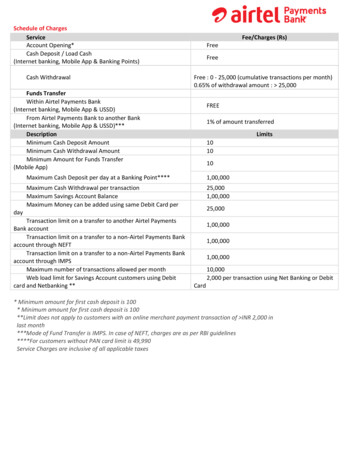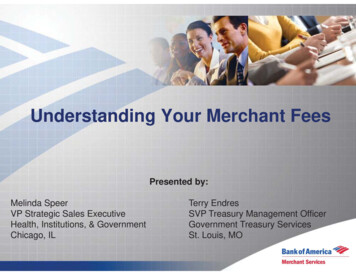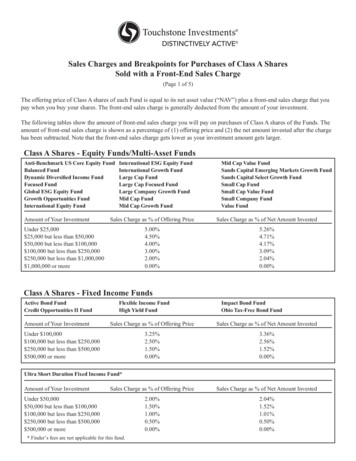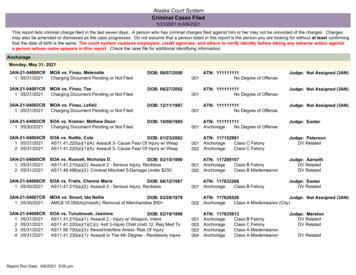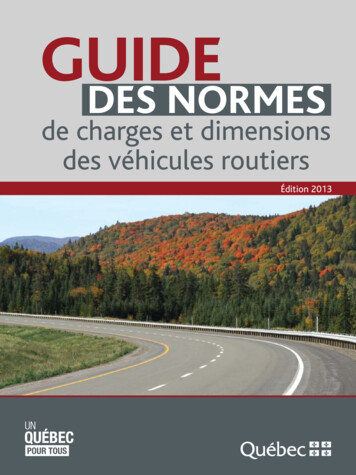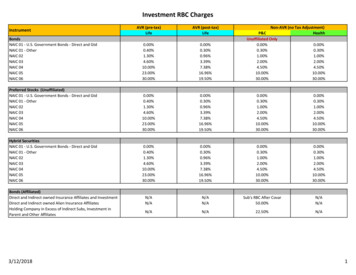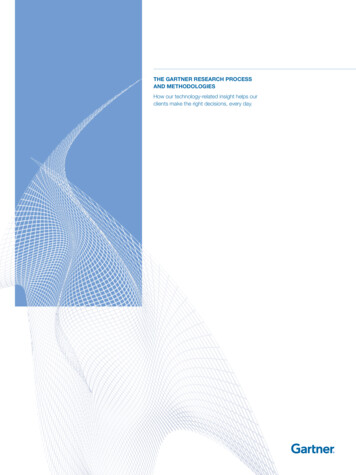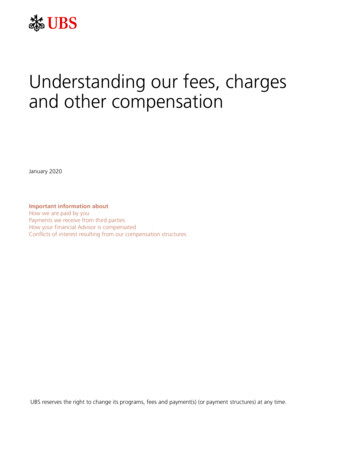
Transcription
Understanding our fees, chargesand other compensationJanuary 2020Important information aboutHow we are paid by youPayments we receive from third partiesHow your Financial Advisor is compensatedConflicts of interest resulting from our compensation structuresUBS reserves the right to change its programs, fees and payment(s) (or payment structures) at any time.
Table of contentsRelated documents and web pages iiMaterial changes made between July 2019 and January 2020 iiAbout our fees, charges and other compensation—general 1Brokerage and advisory services 1Pricing of products and services 1Sources of revenue 1Financial Advisor compensation 3Additional compensation 5Compensation to Financial Advisors in the UBS Wealth Advice Center 6Conflicts of interest 7Financial Advisor compensation 7Products recommended must be offered by UBS 7Revenue sharing 7Revenue from third parties—compensation for data analytics 7Non-cash compensation 7Trading and execution practices 7Conflicts between our asset management and distribution businesses 8Rollovers from an employer-sponsored retirement plan into a UBS IRA 8About our fees, charges and other compensation—by product 9Annuities and insurance 10Banking products 15Individual securities, options and precious metals and municipal securities 20Investment company products 27Alternative investments 32Brokerage account and administrative fees 34Available advisory programs and services 37Mutual fund share classes available in advisory programs 37Non-discretionary advisory programs 38Separately managed account programs and unified managed accounts program 1 38Discretionary advisory programs 39Consulting programs 39Financial planning services 40i
Related documents and web pagesTitleWeb addressConducting business with UBSubs.com/workingwithusAccount information and disclosuresubs.com/accountdisclosuresRevenue Sharing, Networking/Omnibus Fees andNon-Cash tanding your variable annuityubs.com/vadisclosureAnnuity revenue sharing and non-cash compensation inbrokerage accountsubs.com/va-revenuesharingUBS credit and debit cardsubs.com/uscardsCommission schedulesubs.com/commissionsUnderstanding mutual fund share classes, fees andcertain risk considerationsubs.com/mutualfunddisclosureUnit Investment Trustsubs.com/uitdisclosureBest Execution of Equity Securitiesubs.com/bestexecutionOrder Routing Disclosureubs.com/orderroutingdisclosureImportant Information and Disclosures for Retirement Plansubs.com/retirementplandisclosuresImportant information about structured productsubs.com/spkeyrisksMaterial changes made between June 2019 and January 2020SectionMutual Funds (transition to single share class offering inbrokerage accounts)New Pricing on Select UBS Asset Management (AM) strategies in theACCESS and SWPPage2740Important information for Qualified Retirement Plan Fiduciaries holding accounts at UBSThis document, in conjunction with other documents and disclosures we provide to you, is intended to meet the disclosure requirements of theUS Department of Labor’s regulations under ERISA Section 408(b)(2). If you are a retirement plan fiduciary and have questions or need additionalinformation, please see the important information at ubs.com/retirementplandisclosure or contact your Financial Advisor who will provide you withwritten copies of these disclosures upon request. If your plan participates in an investment advisory program with UBS, please refer to our FormADV disclosure at ubs.com/formadv for the particular advisory program or service and to our contract with you. Specifically: Review Item 4 of the Form ADV “Services, Fees and Compensation” for a description of the services we provide under the particular programor service, and the direct and indirect compensation we expect to receive in connection with that program or service Review Item 11 of the Form ADV “Investment Adviser Code of Ethics, Participation or Interest in Client Transactions and Personal Trading”for a description of additional indirect compensation we receive Review Item 14 “client referrals and other compensation” for a description of how we are compensated for referrals from affiliates andthird parties We will act as a Registered Investment Adviser under the Investment Advisers Act of 1940 with respect to any of the advisory programs thatyou select When we provide investment advisory services, our fiduciary status under the federal retirement laws depends on the nature of the specificservices we agree to provide to you. Please see your applicable agreement and related disclosures for more information Your advisory fee is disclosed in your program application or in a notice to you that confirms your fee and your enrollment in ouradvisory programs If you have selected a program that includes management by an investment manager unaffiliated with us, please see the manager’s respectiveForm ADV and/or separate ERISA Section 408(b)(2) disclosure document for information regarding the manager’s specific services and indirectcompensation. We will provide you with the applicable Form ADV for each manager you select in the ACCESS and Strategic Wealth PortfolioPrograms. Managers in the Managed Accounts Consulting and Institutional Consulting Programs will enter into an individualized contractwith you and will provide the Form ADV directlyPlease also review the Conflicts of Interest section of this brochure.ii
About our fees, charges andother compensation—generalOur goal is to make sure our clients are informed about the costs of the various investment products and servicesthat we offer, which is why we publish this overview of our fees and how we generate revenue.Brokerage and advisory servicesAs a UBS Financial Services Inc. client, you benefit from the broad scope of services and resources of a leading globalfinancial services firm, whether we serve you as a broker-dealer, investment advisor or both. While there are similaritiesbetween the brokerage and advisory services we provide, there are important differences, including the pricingstructures for these services. For detailed information regarding the distinctions between brokerage and advisoryservices, please visit our website at ubs.com/workingwithus. This information is also included in the disclosure materialswe provide to you when you open an account(s) at UBS, or in the “Agreements and Disclosures” booklet, which canbe found at ubs.com/accountdisclosures.Brokerage relationships generate transaction-based compensation. In brokerage relationships:Investors pay transaction-based fees in connection with the products and services they receive, such as buying andselling stocks, bonds, mutual funds, annuity contracts and other investment products, as well as trading andexercising options. These include commissions, transaction fees, loads and sales charges. Compensation to UBSincludes commissions, sales concessions, transaction fees, sales charges or expenses that are embedded in thepurchase price as well as compensation from third parties in some cases.Advisory relationships have fee-based compensation. In advisory relationships:Clients pay a set fee or a fee based on a percentage of the assets in the account according to an investmentadvisory program agreement. In some circumstances, UBS, our Financial Advisors and our affiliates receiveadditional compensation from third parties in connection with the assets in clients’ advisory accounts. Thiscompensation is in addition to the fee that a client pays for investment advisory services. For certain alternativeinvestments in advisory accounts, the compensation also includes performance fees.Pricing of products and servicesClients may purchase many of our products and services in either transaction-based or fee-based accounts, ora combination of both.Factors that affect pricing. It is difficult to compare transaction-based and fee-based options solely on the basis ofprice. You may pay more or less in a fee-based program than you would pay if you purchased the products andservices separately in a transaction-based account. The costs of either type of account depend on a number offactors, including: Product and service preferences Size and value of your account(s) Mix of products you hold Frequency with which you trade Administrative or management fees associated with the products or services you purchasePlease consider the costs and services associated with each option carefully and speak with your Financial Advisorabout which approach is most appropriate for you.Sources of revenueOur firm earns revenue from our clients, from our affiliates, and, for some products and services, from third parties,including product vendors, underwriters and investment managers whose products and services are purchased byclients. UBS also receives compensation as a result of intercompany profit-sharing and servicing agreements.Revenue received from clientsIn general, our firm, and our affiliates receive revenue from clients in the following ways: Commissions charged to clients in connection with the purchase or sale of investment products1 of 41
Markups (increases) and markdowns (reductions) on the price of equities and fixed income products, where thefirm acts as principal in purchasing or selling securities for or from UBS’s inventory Asset-based and other fees for our investment advisory programs and services Interest on margin and other loans Administrative fees such as account maintenance fees Sales loads, commissions or fees for various financial products, such as mutual funds, alternative investment funds,unit investment trusts (UITs), insurance and annuitiesRevenue received from clients is debited from accounts unless stated or agreed to otherwise.Revenue from third parties (including affiliates)In addition to revenue that we receive from clients, UBS earns revenue from third parties and affiliates in thefollowing ways: Issuers or underwriters of new issue securities pay us fees and/or offer underwriting discounts or share fees withus in certain cases Mutual fund and insurance companies pay us for offering and placing their products, and many of them also payus for marketing support, known as revenue sharing, which is based on our total sales of and/or total client assetsin their products Mutual fund companies pay recordkeeping and account servicing fees for processing services we provide in accountsheld at UBS Insurance and annuity companies compensate us for the costs of establishing and maintaining their products inour distribution system For some alternative investment funds that are managed by third-party and affiliated investment advisers, we receivefees for distribution, shareholder services or solicitation services, or a combination of the three Third parties providing investment advisory or investment management services pay us fees in the form of arecurring fee, a one-time fee, a portion of the third party’s fees or revenues or as otherwise agreed with the thirdparty, for solicitations, referrals or client services Third parties with whom we offer co-branded programs, such as UBS Donor-Advised Funds, pay referral fees to us Underwriters of securities compensate us for trading activities we provide on their behalf Third-party UITs pay volume-based fees for the sale of their products to our clients Companies that issue investment products (e.g., mutual funds, UITs, exchange traded funds (ETFs), NextShares,insurance companies, investment advisers and other third parties) pay for educational programs and seminarsfor employees and clients Affiliate lenders pay us fees for various loan servicing, collateral monitoring and marketing services. These feescan be in the form of revenue splits between affiliates Unaffiliated third-party lenders pay us referral fees for certain client referrals for loan transactionsAdditional information regarding revenue sharing for mutual funds and annuities can be found atubs.com/mutualfundrevenuesharing and ubs.com/va-revenuesharing.A number of companies that issue investment products that we offer to and place with our clients enter intoagreements to pay UBS an annual fee ranging from 150,000 to 300,000 for receipt of data and analytics relatingto all Financial Advisors and their sales of investment products. Participation by vendors in this program is optionaland is not considered by UBS in determining whether a company’s products will be made available to clients.Revenue to affiliatesWhen you conduct business with us, our affiliates—including UBS Asset Management, UBS Bank USA, UBS FinancialServices Inc. Incorporated of Puerto Rico, UBS Trust Company of Puerto Rico, UBS Limited, London and UBS InvestmentBank—may earn compensation through activities in a client’s account, including: The purchase of securities underwritten by a UBS affiliate Buying securities directly from or selling securities directly to UBS or one of our affiliates Management or other fees in conjunction with mutual funds or other investments purchased that are structured ormanaged by one of our affiliates Management fees earned through investments in a separately managed account managed by UBS or an affiliatedinvestment manager Borrowing or maintaining credit with one of our affiliates Depositing or investing free credit balances into accounts with affiliated entities2 of 41
Revenue from referrals and introductions Trading and hedging activities related to structured products and Exchange Traded Notes (ETNs) Collecting licensing fees from mutual fund, ETF, ETN, structured product and other product providers for indexesor strategies owned by a UBS affiliateOur affiliates typically pay us for referring or introducing clients or investors to them. Likewise, we typically payour affiliates for referring certain clients and business opportunities to our Financial Advisors. Third parties to whomwe introduce clients, including investment managers and investment banks, typically pay us a referral fee.Referral payments can be based on a percentage of the revenue received or as otherwise agreed between the affiliatesor with the third party. Depending on the type of referral, payments can be made over several years.Correcting trading and other errorsWe have procedures for resolving trading and other errors that occur from time to time. UBS maintains one or moreerror accounts to facilitate handling trading and other errors. Gains attributable to trading errors will be offset by lossesattributable to other errors in these error accounts. At the end of the calendar year, any net gains in the error accountare donated to charity.Compensation attributable to float on uninvested cashUBS benefits from deposits and credits to your account(s) before cash balances are invested or swept into the UBS BankSweep Programs or other sweep options (usually the next business day). This benefit is generally in the form of income atthe prevailing market rates on overnight investments averaging 1.76% for the month of October 2019 In some cases, thebenefit is in the form of not needing to borrow from an affiliate to meet daily liquidity needs. The current rate at whichUBS Financial Services Inc. borrows from an affiliate is 1.55% UBS does not receive this benefit for retirement accounts.Financial Advisor compensationIn general, we pay our Financial Advisors cash compensation consisting of two components: a guaranteed monthlyminimum draw required by applicable law and a production payout if it exceeds the monthly minimum draw. Theproduction payout is a percentage (called a payout or grid rate) of the product-related revenue (called production) thateach Financial Advisor generates during that month with respect to the clients he or she serves, minus certainadjustments that are specified by our Financial Advisor Compensation Plan. The payout rate or grid rate is generallybased on production levels and ranges from 28% – 50%. Financial Advisors working as part of a team that meetsminimum production requirements can qualify for a higher grid rate (but not above 50%) than they would receiveworking as an individual.We reserve the right, at our discretion and without prior notice, to change the methods by which we compensate ourFinancial Advisors and employees, including reducing and/or denying production payout and/or awards at our discretionfor any reason.For our Investment Advisory Programs (asset-based fee programs), the payout rate is applied to the program feescredited to the Financial Advisor by the firm, but the payout is generally reduced for accounts priced below certainthresholds. Advisory accounts in relationships with assets over certain thresholds may have customized pricing andpayouts as approved by the firm. We reduce or terminate the payout rates described above to Financial Advisors inconnection with accounts they service that do not meet certain prescribed asset levels on a household basis or fortransactions or fees below specified amounts.The standard compensation structure creates financial incentives for Financial Advisors to encourage clients to purchasemultiple products and services and to choose a payment structure for products and services that generate greatercompensation. Financial Advisors are also eligible to receive certain awards based on their production, length of servicewith UBS and net new business.Under certain circumstances (e.g., acquisitions and recruitment or particular programs or designations such as theWealth Advice Center, Wealth Planning Associate, Financial Advisor Associate, Institutional Consulting and RetirementPlan Consulting Services), some Financial Advisors or producing Branch Managers are compensated differently.Production for Retirement Accounts in Investment Advisory Consulting Programs: With respect to retirementaccount clients enrolled in the RPCS, IC or OCIO programs, who al
Mutual fund and insurance companies pay us for offering and placing their products, and many of them also pay us for marketing support, known as revenue sharing, which is based on our to
